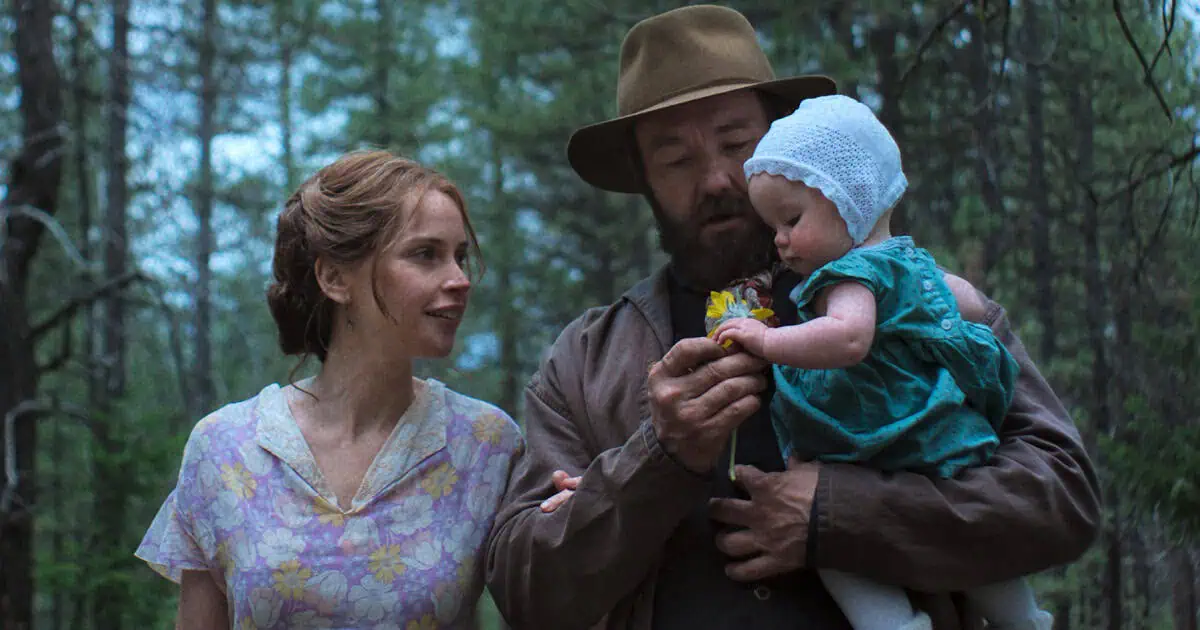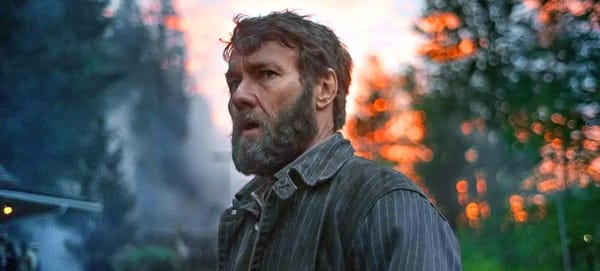★★★½ (3½ out of 4)
Poetic in image, sound and the expanse of its soaring spirit, “Train Dreams” hits theater (in advance of its Nov.24 debut on Netflix) with those three strikes against it. Don’t audiences just want to giggle, sniffle or grow braindead to their problems for a few effing hours? Yeah, but not always. Not when a movie dares to reach for the stars like this one. Please, make room for “Train Dreams.” You won’t regret it.
Director Clint Bentley wrote the script with Greg Kwedar. They did the same thing last year with “Sing Sing,” another Oscar-nominated outlier that Kwedar directed and audiences yawned off. See above for the reasons. Filmmaker Terrence Malick, whose cinema tone poems “Train Dreams” resembles, has spent a career winning critical raves and audience indifference. But he’s still out there, barely making a film every five years, but thinking the struggle to make it matters.
Creative persistence also takes root in Robert Grainer, a logger and laborer on railroad construction projects in the Pacific Northwest at the start of 20th century. Though Grainier groans from backbreaking labor, often in the midst of fire and flood, you’ll barely hear a word of complaint from this bearded giant about it. Or about anything, since silence is his default.
The railroad disasters pile up with wearying frequency, but Joel Edgerton and Felicity Jones bring flesh-and-blood immediacy to this classic in the making.
So it seems fitting that this anti-showoff should be played by the grandmaster of subtlety, the criminally underrated Aussie actor Joel Edgerton. He ought to be a star by now for the nuance he’s brought to such films as “Loving,” “Animal Kingdom” and two “Star Wars” epics. Here, in a performance of indelible implosive power, Edgerton strikes just the right notes of humanity under siege.
Adapted from a 2011 novella by Denis Johnson, “Train Dreams” shows how to build a country fueled by rapid changes and rampant racism. One incident, involving the murder of a Chinese immigrant worker in which Grainier is implicated, haunts him in often supernatural fever dreams about the damage done in the name of heedless American progress.
For escape and comfort, Grainier turns to Gladys, given a nurturing purity by the radiant Felicity Jones. In between Grainier’s frequent absences for work, they build a life together that brings him the closest he gets to unalloyed joy, especially after the birth of their daughter, Kate. Tragedy, of course, must follow.

The script has few spoken words, outside of narration by Will Patton, relying on visual impressions from the sublime cinematographer Adolpho Veloso that bring grit and grace to every frame. In tandem with the musical splendor delivered by Bryce Dessner (a member of The National), “Train Dreams” is a feast for the senses, even when the unthinkable strikes out of nowhere.
The film slips into off-putting rectitude when it treats Grainier as a modern Job with suffering and loss as his fate. There’s no doubt that audiences might squirm as the railroad disasters pile up with wearying frequency. It’s up to Edgerton and Jones to bring flesh-and-blood immediacy to these characters, which they do magnificently as they imbue this classic in the making with a beating, often grieving heart.
.
Class actors, including the great William H. Macy, Clifton Collins Jr., Johnny Arnoux and Kerry Condon, all figure briefly but bracingly in the action as Grainier presses on, determined to beat the odds against his survival.
Essential to the film’s success as an intimate epic as it sweeps Grainier into 1968 and the moon launch of Apollo 8 are the rich details and thematic resonance that bring a cumulative power to the piece that stays with you long after you leave the theater.
Lucky for us, Bentley and Gwedar follow Grainier’s lead in forging their own rigorous path. Hitting the box office sweet spot of trendiness is the last thing on their questing minds. “Train Dreams” delivers truths that don’t go down easy. Brute nature and human weakness clash in a film dreamed into being by visionaries. Think it through and you’re left with the strong impression that you’ve been let in on the birth of a new film landmark. Act accordingly.

